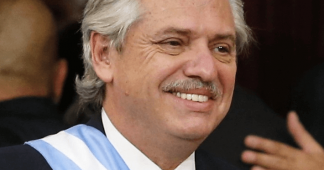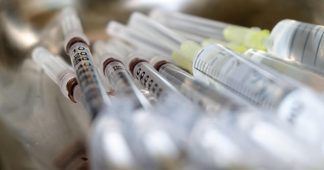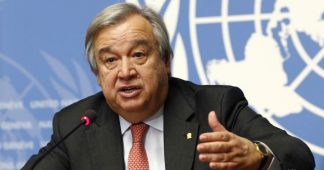June 11, 2021
As world leaders gather for the first in-person G7 summit in two years, talks are set to focus heavily on ending the pandemic and the climate crisis, and climate activists are calling on them for more immediate action. “It’s not just one crisis,” says Asad Rehman, executive director of War on Want and spokesperson for the COP26 Climate Coalition. “What we’ve seen is simply rich countries doing too little too late and not taking up their responsibility, and unfortunately this G7 has not changed that at all.”
Transcript
This is a rush transcript. Copy may not be in its final form.
AMY GOODMAN: World leaders are gathered in Cornwall in the U.K. for the first in-person G7 summit in two years. Talks are set to focus heavily on ending the pandemic and the climate crisis. President Biden announced the U.S. would donate an additional half-billion COVID vaccine doses, quote, “with no strings attached.”
PRESIDENT JOE BIDEN: America will be the arsenal of vaccines in our fight against COVID-19, just as America was the arsenal of democracy during World War II. … This U.S. contribution is the foundation for additional coordinated efforts to help vaccine the world — vaccinate the world.
AMY GOODMAN: While Biden announced there will be no strings attached, the vaccine doses will not go to Venezuela, which is under U.S. sanction. Leaders of the G7 nations are collectively pledging to donate a billion vaccine doses to poorer countries. Advocacy groups are continuing to apply pressure on governments to do more to end the global vaccine apartheid, including waiving intellectual property protections on vaccines.
Protests are planned throughout the summit amidst a heavy police presence. Climate activists and groups including Greenpeace and Extinction Rebellion are staging actions to urge more forceful and immediate action from G7 nations. Ahead of the summit, U.N. Secretary-General António Guterres told NBC News the climate crisis is urgent.
SECRETARY–GENERAL ANTÓNIO GUTERRES: When you are at the verge of the abyss, you must be very careful about your next step, because if the next step is in the wrong direction, you will fall.
ANNE THOMPSON: How much time is left to act?
SECRETARY–GENERAL ANTÓNIO GUTERRES: I think this year is the make-it-or-break-it year. If we fail in Glasgow, we’ll be in a very difficult situation. As I said, on the verge of the abyss, you must make sure that the next step is in the right direction.
AMY GOODMAN: G7 members are expected today to endorse a minimum global tax rate of 15%.
For more, we’re joined in London by Asad Rehman, executive director of War on Want, spokesperson for the COP26 Climate Coalition.
So, it’s all happening in Cornwall, the first in-person meeting of the G7, Asad. What are climate activists around the world demanding? And what are the plans for this weekend?
ASAD REHMAN: Well, as your intro said, the G7, the richest and the most powerful economies in the world, are meeting. But the people who are not around the table are, of course, those who are going to pay the price for their decisions: the poorer majority of the world. And the G7 meet at a critical moment, because it’s not just one crisis, but we face multiple and companion crises, so extreme that we’re not just at the crossroads in human history, we’re, of course, heading towards a point of no return. And unfortunately, from the pronouncements that we’ve already seen and from what we understand will come out of the G7 in terms of the summit, they can see that our house is on fire, yet, frankly, they’re still discussing what color to paint the door.
So, let’s just take the climate crisis for example. Despite all the promises to act on the climate emergency and recognizing whilst no threshold is safe, and as we can see from the devastating impacts for millions of lives as we breach 1 degree, that we have to prevent temperatures breaching 1.5, what we’re seeing is carbon emissions in 2021 at the highest in a decade. Temperature levels are heading towards at least two-and-a-half degrees, if not more. The G7 is still pouring close to 189 billion to fossil fuel extraction. They’re not making the pledges that are needed to make sure that they’re doing their fair share. And they’re still not even meeting the broken promise of a decade ago of realizing 100 billion in much-needed climate finance, when every estimate says at least the minimum that is now needed is at least close to a trillion a year, for each and every year for the coming decade.
This is no longer about climate denialism. What we’re seeing is, is mitigation denialism. It’s the hope that somehow — and John Kerry famously said this at the G7 finance ministers’ meeting — that our quality of life is not up for negotiation, but we’re going to rely on technologies that don’t exist currently and that, somewhere in the future, is going to suck out hundreds — and I say hundreds — of billions of tons of carbon from the atmosphere. I mean, that is just unprecedented, public policy being made on the hope of fingers being crossed and that something will rescue us in the future. And the poorest will pay the price.
AMY GOODMAN: I want to turn to another clip of U.N. Secretary-General António Guterres in an interview that originally appeared on NBC News and is broadcast here as part of Covering Climate Now, a global consortium of news outlets strengthening coverage of the climate story. He was interviewed by reporter Anne Thompson.
ANNE THOMPSON: Can the world combat the worst of climate change without helping poor countries?
SECRETARY–GENERAL ANTÓNIO GUTERRES: It’s impossible. … You need to create the conditions for a transition from coal to renewable energy. And that, of course, requires financial investment, financial support and technological support to developing countries that still rely on coal for their own energy needs. … More and more countries are committing not to finance coal plants even abroad. Korea has done it. I hope the G7 will be able to do it.
AMY GOODMAN: And so, Asad Rehman, talk more about this moment, where climate — it’s the first time ever it’s on the agenda of G7. And also, if you can talk specifically about Britain’s role on climate? The U.K. recently called for a climate Marshall Plan. And your assessment of President Biden’s plans?
ASAD REHMAN: Well, the U.K. government takes the world stage and claims that it’s a climate leader and says, “We’ve cut our emissions by 50%.” But, actually, if you take out the — because none of those emissions include aviation or shipping or all the embedded emissions of the issues that — of the products that the U.K. consumes, we’re actually only talking about 15% emission reductions. That’s about half a percent of emission reduction. We’re nowhere near the scale of emission reductions. Rich countries are still talking about net-zero goals in 2050, when they should be talking about decarbonizing by 2030.
And the COVID pandemic gives us a really good example of how these rich countries are, of course, responding, both to the COVID pandemic, but also to the climate crisis. We’ve all heard the words, “No one is safe until everyone is safe.” We can all see that millions of people are dying around in every corner of the world. And yet rich countries not just hoarded the vaccines, meaning that at the current rate it will be 57 years before everyone in the world is vaccinated, but they’re actively backing Big Pharma and protecting their profits. Now, if they won’t lift the intellectual property rights on COVID vaccines, what hope is there for poorer countries that they’re going to lift the intellectual property rights and provide the technology and the finance for them to be able to deal with the climate impacts, to be able to grow cleanly, to be able to transition away from the fossil fuel economy?
And this is, of course, at the very same time as this incredible crisis of inequality, where 80% of the world faces poverty, half of it is still struggling on the equivalent of $5 a day, and not just facing that, but is rapidly getting worse. We’ve heard over the last year 500 million jobs have been lost. Hundreds of millions of people have been pushed into extreme poverty. The very tools that rich countries use to protect their economies are being denied to those in poorer countries. And what we’ve seen is simply rich countries doing too little too late and not taking up their responsibility, and unfortunately this G7 has not changed that at all.
AMY GOODMAN: And finally, your organization, War on Want, a global anti-poverty organization, does more than focus on climate, so if you can make the link, and what you demand of the G7, not only around climate, but also in the midst of this pandemic? You have climate apartheid, what countries get hit the hardest, and also, of course, vaccine apartheid.
ASAD REHMAN: Absolutely. We see these forms of apartheid being played out. As you rightly said, we see a COVID apartheid, we see climate apartheid, we see economic apartheid. We see inequality and injustice all around the world.
Really, what the G7 should be announcing is a global Green New Deal. They should be announcing and saying, “We’re committed to making sure that everybody has the right to a living wage, to universal public services, health, education, housing.” We all have seen how critical they are, not only to dealing with the pandemic, but are critical in terms of dealing with the climate crisis. We need to make food and energy a public good, so that we can share them equitably. We have enough in the world, but, of course, much of it is concentrated in the hands of a small elite. Just the top 1%, their emissions currently are double those of the bottom three-and-a-half billion people. If they were just reducing their emissions, we’d begin to see a major step forward.
We need a radical transformation of our broken economy. We need to fix our unjust fair trade — unjust trade rules. We need to cap the power of corporations. And even the announcement about taxation of multinationals, it’s, yes, a small step forward on the 15%, but we already can see that they are actively saying that that won’t apply to finance, that won’t apply to the big banks, that already there are going to be so many loopholes. What we really need is about 25% corporation tax around the world.
We need to make sure that we’re not just canceling debt for the poorer countries, but actually we have a plan of reparations, of finance going from the Global North to the Global South. It’s no good talking about charity. And all of these countries talk about, you know, that their response has been greatly charitable. For every $1 that is going from the North to the South, $24 flows the other way and enriches our big multinationals and countries in the Global North.
We can no longer tinker around the edges. We need a fundamental transition. And these coming years will determine, literally, the shape of the world. It will determine who dies, who lives, and what kind of economy that we’re going to have. There is incredible demands coming up from the bottom — you see it in every corner of the world — basically saying, “Our economy is no longer fit for purpose. It’s failing people. It doesn’t give people the quality of life that they need. It doesn’t give them dignity. We need a transformation.”
AMY GOODMAN: Asad Rehman, I want to thank you for being with us, executive director of War on Want, global anti-poverty group, and the spokesperson for the COP26 Climate Coalition, speaking to us from London.
Next up, the Biden administration continues to seek the extradition of WikiLeaks founder Julian Assange from Britain to the United States, where he faces up to 175 years in prison. We’ll speak to Julian’s father and half-brother. They’re touring the United States to advocate for his release from a high-security prison in Britain. Stay with us.
Published at www.democracynow.org










